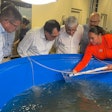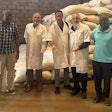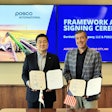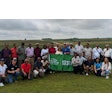
Last week, the U.S. Grains Council (USGC) facilitated a visit for a South Korean biotechnology legislation advisory team, consisting of scientists and governmental committee members, to meet with U.S. regulators and leading biotechnology companies. The objective was to gain insight into the development trends and quality-control systems of U.S. genome editing technology.
Haksoo Kim, the USGC director in South Korea, emphasized the program's focus on educating policymakers about the deregulation of gene editing technology in South Korea and aiding in the establishment of a rational and scientific review process for genetically edited products.
The delegation's journey began in Washington, D.C., where they met with Pairwise, a gene editing company, to discuss crop varieties currently being grown by U.S. farmers. This was followed by meetings at the U.S. Department of Agriculture’s (USDA) headquarters with staff from the Animal and Plant Health Inspection Service (APHIS), the Environmental Protection Agency (EPA), and the Food and Drug Administration (FDA). These discussions centered around the science-based regulatory framework in the U.S. that fosters technological development and the benefits of gene editing for agriculture and humanity.
The team then traveled to Des Moines, Iowa, where they visited Corteva, a biotechnology company, to learn about the practical applications of genome editing technologies. They also met with Dan Keitzer, Director of the Iowa Corn Growers’ Association, at his farm. Keitzer shared sustainable farming practices, such as no-till farming, and demonstrated how biotechnology adds value to crop production and agriculture's future.
The program concluded in St. Louis, Missouri, with a visit to Bayer’s research campus. Discussions there focused on the need for streamlining South Korea's biotech review system and the latest trends in genome editing technology. The group also engaged with scientists from Benson Hill, a startup specializing in soybean and pea breeding, to better understand growth models for small and medium-sized enterprises.
Kim noted that the visit provided valuable insights for Korean policymakers and stakeholders, helping them understand the safety and sustainability of biotechnologies in agriculture. He also emphasized the USGC’s ongoing efforts to improve global buyer awareness and encourage science-based regulatory systems worldwide to prevent biotechnology from becoming a barrier to U.S. agricultural exports.

















